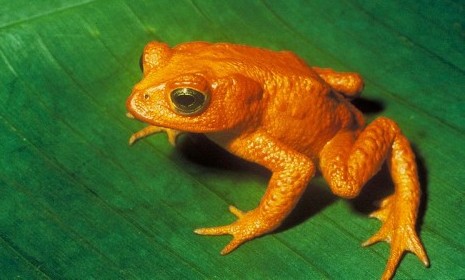Can toads predict earthquakes?
Seismologists say toads fled an Italian lake days before a quake struck. Do they know something we don't?

A free daily email with the biggest news stories of the day – and the best features from TheWeek.com
You are now subscribed
Your newsletter sign-up was successful
Seismologists are still unable to predict earthquakes more than a few seconds before they occur, but it appears that our amphibian friends may have better luck. A study published in the Zoological Society of London's Journal of Zoology found that a colony of toads left their breeding site in Italy three days before an earthquake struck last year. How did this happen, and why? (Watch a Fox report about earthquake-predicting toads)
What exactly did the toads do?
Researchers happened to be observing a colony of toads 46 miles from the epicenter of a 6.3 magnitude earthquake that hit the Italian town of L'Aquila, killing hundreds of people. Five days before the quake hit, 96 percent of the male toads left the site at San Ruffino Lake — which is highly unusual, as males normally stick around until spawning is finished. Three days before the temblor, the number of breeding pairs had fallen to zero.
The Week
Escape your echo chamber. Get the facts behind the news, plus analysis from multiple perspectives.

Sign up for The Week's Free Newsletters
From our morning news briefing to a weekly Good News Newsletter, get the best of The Week delivered directly to your inbox.
From our morning news briefing to a weekly Good News Newsletter, get the best of The Week delivered directly to your inbox.
Did the toads come back?
Yes, they started trickling home right after the earthquake. But most only returned days later, after the last big aftershock. For six days before the earthquake and six days after it, no spawn was laid at the lake. Then, says the study's lead author, biologist Rachel Grant of the U.K.'s Open University, the toads started carrying on as before. Grant says the toads had probably fled to higher ground to escape rock falls, landslides, and flooding. "A landslide or flood could wipe out virtually 100 per cent of the males," says Grant, "and quite a lot of the females."
How did they know to leave?
Biologists can't say for sure. But around the time the toads disappeared scientists detected disruptions in the ionosphere, the uppermost electromagnetic layer of Earth's atmosphere. Some scientists think these changes could coincide with release of radon gas or gravity waves ahead of an earthquake. "Our findings suggest that toads are able to detect pre-seismic cues such as the release of gases and charged particles," Grant says, "and use these as a form of earthquake early warning system."
A free daily email with the biggest news stories of the day – and the best features from TheWeek.com
Is this the first evidence of animals predicting earthquakes?
No. There are similar reports dating back to at least 373 B.C., when rats, snakes, and weasels scurried out of Helice in Greece days before a quake devastated that city. More recently, people have noticed dogs biting more frequently and bees leaving their hives before earthquakes. In two other studies conducted as earthquakes hit, ants stayed put during one quake, and birds flew off 20 minutes ahead of another.
Why haven't researchers confirmed what animals know yet?
It's hard to conduct scientific studies of how animals act before earthquakes because humans haven't figured out how to accurately predict when they'll happen. Since quakes are rare and unpredictable, scientists can't study them unless, like Grant, they happen to be in the right place at the right time.
Sources: ABC News, BBC, Daily Mail, Discovery, AP
-
 Labor secretary’s husband barred amid assault probe
Labor secretary’s husband barred amid assault probeSpeed Read Shawn DeRemer, the husband of Labor Secretary Lori Chavez-DeRemer, has been accused of sexual assault
-
 Trump touts pledges at 1st Board of Peace meeting
Trump touts pledges at 1st Board of Peace meetingSpeed Read At the inaugural meeting, the president announced nine countries have agreed to pledge a combined $7 billion for a Gaza relief package
-
 Britain’s ex-Prince Andrew arrested over Epstein ties
Britain’s ex-Prince Andrew arrested over Epstein tiesSpeed Read The younger brother of King Charles III has not yet been charged